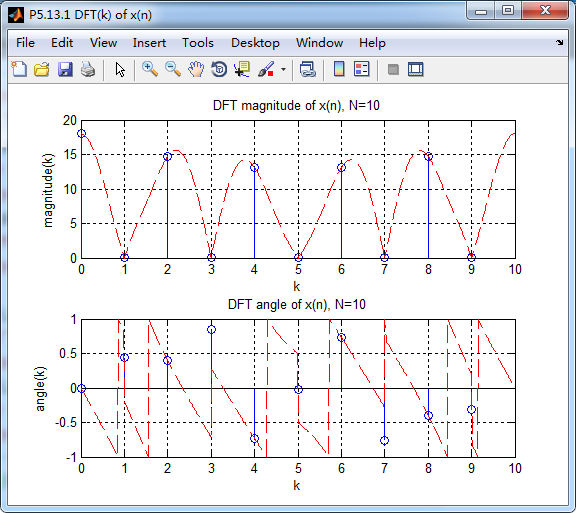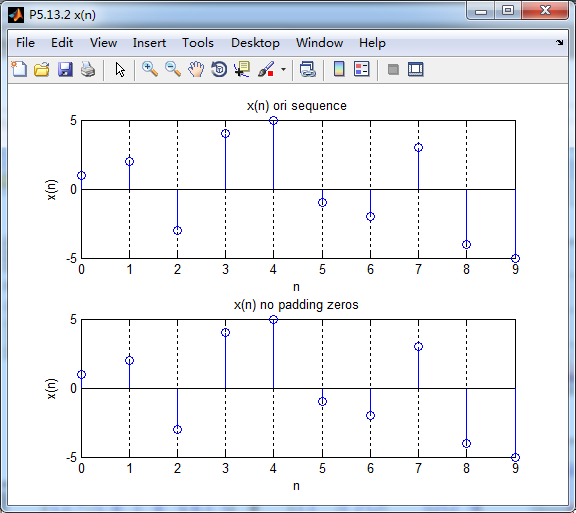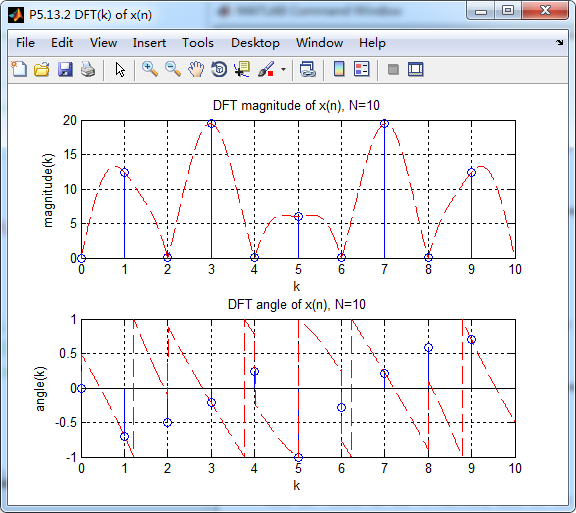《DSP using MATLAB》Problem 5.13


1、 代码:
%% ++++++++++++++++++++++++++++++++++++++++++++++++++++++++++++++++++++++++++++++++
%% Output Info about this m-file
fprintf('\n***********************************************************\n');
fprintf(' <DSP using MATLAB> Problem 5.13 \n\n'); banner();
%% ++++++++++++++++++++++++++++++++++++++++++++++++++++++++++++++++++++++++++++++++ % -----------------------------------------------------------------
% 1 x(n) = [1, 2, -3, 4, 5, 1, 2, -3, 4, 5]
% x(n) = x(n+N/2) N=even integer
% ----------------------------------------------------------------- nn1 = [0:9];
xx1 = [1, 2, -3, 4, 5, 1, 2, -3, 4, 5];
NN1 = length(xx1); % length is 10 %m = mod_1(nn1, NN1);
%x = [xx1 zeros(1, 0)]; % padding zeros
%n = [nn1 max(nn1)+1:max(nn1)+6];
x = xx1;
n = nn1; figure('NumberTitle', 'off', 'Name', 'P5.13.1 x(n)')
set(gcf,'Color','white');
subplot(2,1,1); stem(nn1, xx1);
xlabel('n'); ylabel('x(n)');
title('x(n) ori sequence'); grid on;
subplot(2,1,2); stem(n, x);
xlabel('n'); ylabel('x(n)');
title('x(n) padding zeros'); grid on; %% =============================================================================
%% DTFT X(w) of xn sequence, w=[0:2pi],
%% =============================================================================
MM = 500;
[Xw_DTFT, w] = dtft1(x, n, MM); magXw_DTFT = abs(Xw_DTFT); angXw_DTFT = angle(Xw_DTFT)/pi;
realXw_DTFT = real(Xw_DTFT); imagXw_DTFT = imag(Xw_DTFT); %% --------------------------------------------------------------
%% START X_DTFT's mag ang real imag
%% --------------------------------------------------------------
figure('NumberTitle', 'off', 'Name', 'P5.13.1 X(w) DTFT of x(n)');
set(gcf,'Color','white');
subplot(2,2,1); plot(w/pi,magXw_DTFT); grid on; % axis([-2,2,0,15]);
title('Magnitude Part');
xlabel('frequency in \pi units'); ylabel('Magnitude |X\_DTFT|');
subplot(2,2,3); plot(w/pi, angXw_DTFT); grid on; % axis([-2,2,-1,1]);
title('Angle Part');
xlabel('frequency in \pi units'); ylabel('Rad \pi'); %axis([-200,200,0,2]); subplot('2,2,2'); plot(w/pi, realXw_DTFT); grid on;
title('Real Part');
xlabel('frequency in \pi units'); ylabel('Real');
subplot('2,2,4'); plot(w/pi, imagXw_DTFT); grid on;
title('Imaginary Part');
xlabel('frequency in \pi units'); ylabel('Imaginary');
%% --------------------------------------------------------------
%% END X_DTFT's mag ang real imag
%% -------------------------------------------------------------- %% ------------------------------------------------------------------
%% DFT(k) of xn sequence, k=[0:N-1]
%% w=2pi*k/N k=Nw/(2pi)
%% ------------------------------------------------------------------
N1 = length(x);
k1 = [0 : N1-1];
%k2 = [-N : N-1];
%k3 = [-N/2 : N/2];
Xk_DFT = dft(x, N1); % DFT
magXk_DFT = abs( [ Xk_DFT ] ); % DFT magnitude
angXk_DFT = angle( [Xk_DFT] )/pi; % DFT angle
realXk_DFT = real(Xk_DFT); imagXk_DFT = imag(Xk_DFT); figure('NumberTitle', 'off', 'Name', 'P5.13.1 DFT(k) of x(n)')
set(gcf,'Color','white');
subplot(2,1,1); stem(k1, magXk_DFT); hold on; plot(N1*w/(2*pi), magXw_DTFT,'r--'); hold off;
%axis([-N/2, N/2, -0.5, 50.5]);
xlabel('k'); ylabel('magnitude(k)');
title('DFT magnitude of x(n), N=10'); grid on;
subplot(2,1,2); stem(k1, angXk_DFT); hold on; plot(N1*w/(2*pi), angXw_DTFT,'r--'); hold off;
%axis([-N/2, N/2, -0.5, 50.5]);
xlabel('k'); ylabel('angle(k)');
title('DFT angle of x(n), N=10'); grid on;
运行结果:




2、代码
%% ++++++++++++++++++++++++++++++++++++++++++++++++++++++++++++++++++++++++++++++++
%% Output Info about this m-file
fprintf('\n***********************************************************\n');
fprintf(' <DSP using MATLAB> Problem 5.13 \n\n'); banner();
%% ++++++++++++++++++++++++++++++++++++++++++++++++++++++++++++++++++++++++++++++++ % -----------------------------------------------------------------
% 2 x(n) = [1, 2, -3, 4, 5, -1, -2, 3, -4, -5]
% x(n) = -x(n + N/2) N=even integer
% ----------------------------------------------------------------- nn1 = [0:9];
xx1 = [1, 2, -3, 4, 5, -1, -2, 3, -4, -5];
NN1 = length(xx1); % length is 10 %m = mod_1(nn1, NN1);
%x = [xx1 zeros(1, 0)]; % padding zeros
%n = [nn1 max(nn1)+1:max(nn1)+6];
x = xx1;
n = nn1; figure('NumberTitle', 'off', 'Name', 'P5.13.2 x(n)')
set(gcf,'Color','white');
subplot(2,1,1); stem(nn1, xx1);
xlabel('n'); ylabel('x(n)');
title('x(n) ori sequence'); grid on;
subplot(2,1,2); stem(n, x);
xlabel('n'); ylabel('x(n)');
title('x(n) no padding zeros'); grid on; %% =============================================================================
%% DTFT X(w) of xn sequence, w=[0:2pi],
%% =============================================================================
MM = 500;
[Xw_DTFT, w] = dtft1(x, n, MM); magXw_DTFT = abs(Xw_DTFT); angXw_DTFT = angle(Xw_DTFT)/pi;
realXw_DTFT = real(Xw_DTFT); imagXw_DTFT = imag(Xw_DTFT); %% --------------------------------------------------------------
%% START X_DTFT's mag ang real imag
%% --------------------------------------------------------------
figure('NumberTitle', 'off', 'Name', 'P5.13.2 X(w) DTFT of x(n)');
set(gcf,'Color','white');
subplot(2,2,1); plot(w/pi,magXw_DTFT); grid on; % axis([-2,2,0,15]);
title('Magnitude Part');
xlabel('frequency in \pi units'); ylabel('Magnitude |X\_DTFT|');
subplot(2,2,3); plot(w/pi, angXw_DTFT); grid on; % axis([-2,2,-1,1]);
title('Angle Part');
xlabel('frequency in \pi units'); ylabel('Rad \pi'); %axis([-200,200,0,2]); subplot('2,2,2'); plot(w/pi, realXw_DTFT); grid on;
title('Real Part');
xlabel('frequency in \pi units'); ylabel('Real');
subplot('2,2,4'); plot(w/pi, imagXw_DTFT); grid on;
title('Imaginary Part');
xlabel('frequency in \pi units'); ylabel('Imaginary');
%% --------------------------------------------------------------
%% END X_DTFT's mag ang real imag
%% -------------------------------------------------------------- %% ------------------------------------------------------------------
%% DFT(k) of xn sequence, k=[0:N-1]
%% w=2pi*k/N k=Nw/(2pi)
%% ------------------------------------------------------------------
N1 = length(x);
k1 = [0 : N1-1];
%k2 = [-N : N-1];
%k3 = [-N/2 : N/2];
Xk_DFT = dft(x, N1); % DFT
magXk_DFT = abs( [ Xk_DFT ] ); % DFT magnitude
angXk_DFT = angle( [Xk_DFT] )/pi; % DFT angle
realXk_DFT = real(Xk_DFT); imagXk_DFT = imag(Xk_DFT); figure('NumberTitle', 'off', 'Name', 'P5.13.2 DFT(k) of x(n)')
set(gcf,'Color','white');
subplot(2,1,1); stem(k1, magXk_DFT); hold on; plot(N1*w/(2*pi), magXw_DTFT,'r--'); hold off;
%axis([-N/2, N/2, -0.5, 50.5]);
xlabel('k'); ylabel('magnitude(k)');
title('DFT magnitude of x(n), N=10'); grid on;
subplot(2,1,2); stem(k1, angXk_DFT); hold on; plot(N1*w/(2*pi), angXw_DTFT,'r--'); hold off;
%axis([-N/2, N/2, -0.5, 50.5]);
xlabel('k'); ylabel('angle(k)');
title('DFT angle of x(n), N=10'); grid on;
运行结果:



《DSP using MATLAB》Problem 5.13的更多相关文章
- 《DSP using MATLAB》Problem 7.13
代码: %% ++++++++++++++++++++++++++++++++++++++++++++++++++++++++++++++++++++++++++++++++ %% Output In ...
- 《DSP using MATLAB》Problem 6.13
代码: %% ++++++++++++++++++++++++++++++++++++++++++++++++++++++++++++++++++++++++++++++++ %% Output In ...
- 《DSP using MATLAB》Problem 4.13
代码: %% ---------------------------------------------------------------------------- %% Output Info a ...
- 《DSP using MATLAB》Problem 8.13
代码: %% ------------------------------------------------------------------------ %% Output Info about ...
- 《DSP using MATLAB》Problem 6.12
代码: %% ++++++++++++++++++++++++++++++++++++++++++++++++++++++++++++++++++++++++++++++++ %% Output In ...
- 《DSP using MATLAB》Problem 6.10
代码: %% ++++++++++++++++++++++++++++++++++++++++++++++++++++++++++++++++++++++++++++++++ %% Output In ...
- 《DSP using MATLAB》Problem 4.11
代码: %% ---------------------------------------------------------------------------- %% Output Info a ...
- 《DSP using MATLAB》Problem 3.3
按照题目的意思需要利用DTFT的性质,得到序列的DTFT结果(公式表示),本人数学功底太差,就不写了,直接用 书中的方法计算并画图. 代码: %% -------------------------- ...
- 《DSP using MATLAB》Problem 3.1
先写DTFT子函数: function [X] = dtft(x, n, w) %% --------------------------------------------------------- ...
随机推荐
- shell 数值运算
declare数值运算 linux默认变量类型为字符串 declare [+/-] [选项] 变量名 '-' 给变量设定类型属性 '+' 取消变量的类型属性 '-a' 将变量声明为数组型 '-i' 将 ...
- Vue + Element UI 实现权限管理系统(工具模块封装)
封装 axios 模块 封装背景 使用axios发起一个请求是比较简单的事情,但是axios没有进行封装复用,项目越来越大,会引起越来越多的代码冗余,让代码变得越来越难维护.所以我们在这里先对 axi ...
- 个人前端学习路线图与github优秀前端开发者的路线图推荐
1.个人目前学习的路线图 2.github优秀前端开发者的路线图推荐 打开github首页,在搜索框输入developer-roadmap,搜索github前端路线图 选择kamranahmedse/ ...
- java唯一ID生成
有时我们不依赖于数据库中自动递增的字段产生唯一ID,比如多表同一字段需要统一一个唯一ID,这时就需要用程序来生成一个唯一的全局ID,然后在数据库事务中同时插入到多章表中实现同步. 在java中有个类工 ...
- vue安装与配置
直接引入 <script src="https://unpkg.com/vue"></script> 用npm安装 $ npm install vue ...
- 8.2 C++标准输出流对象
参考:http://www.weixueyuan.net/view/6408.html 总结: iostream头文件,包含了该头文件后,我们就可以直接使用这些对象,包含标准的输出流对象cout.ce ...
- JAVA 中的MessageDigest类和Mac类的使用
MessageDigest 消息摘要 例子: MD5加密: try{ MessageDigest md5 = MessageDigest.getInstance("MD5"); m ...
- tf.trainable_variables() and tf.all_variables()
tf.trainable_variables() 返回的是 所有需要训练的变量列表 tf.all_variables() 返回的是 所有变量的列表 v = tf.Variable(0, name=' ...
- TransactionScop事务机制的使用
如果在C#中使用TransactionScope类(分布式事务),则须注意如下事项:1.在项目中引用using System.Transactions命名空间(先要在添加net组件的引用); 2.具体 ...
- <算法><Union Find并查集>
Intro 想象这样的应用场景:给定一些点,随着程序输入,不断地添加点之间的连通关系(边),整个图的连通关系也在变化.这时候我们如何维护整个图的连通性(即判断任意两个点之间的连通性)呢? 一个比较简单 ...
